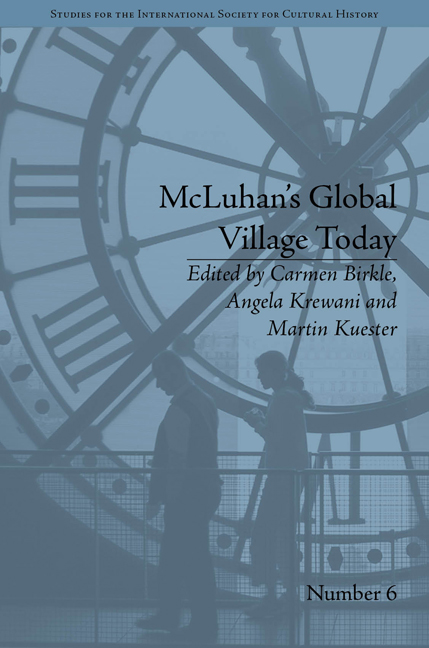Book contents
- Frontmatter
- CONTENTS
- List of Contributors
- List of Figures
- McLuhan's Global Village Today: An Introduction
- Part I McLuhan and Media Theory
- 1 In-Corporating the Global Village
- 2 Metaphorical Effects: McLuhan's Media
- 3 Hot/Cool vs Technological/Symbolic: McLuhan and Kittler
- 4 Global Immediacy
- 5 The Complementary Aspects of Marshall McLuhan and Postmodernism in the Literary Study of the Internet: Exemplified in the Rhizome Theory of Gilles Deleuze and Félix Guattari
- 6 Dubjection: A Node (Reflections on Web-Conferencing, McLuhan and Intellectual Property)
- Part II McLuhan and Literature
- Part III McLuhan and Technical Media
- Notes
- Index
4 - Global Immediacy
from Part I - McLuhan and Media Theory
- Frontmatter
- CONTENTS
- List of Contributors
- List of Figures
- McLuhan's Global Village Today: An Introduction
- Part I McLuhan and Media Theory
- 1 In-Corporating the Global Village
- 2 Metaphorical Effects: McLuhan's Media
- 3 Hot/Cool vs Technological/Symbolic: McLuhan and Kittler
- 4 Global Immediacy
- 5 The Complementary Aspects of Marshall McLuhan and Postmodernism in the Literary Study of the Internet: Exemplified in the Rhizome Theory of Gilles Deleuze and Félix Guattari
- 6 Dubjection: A Node (Reflections on Web-Conferencing, McLuhan and Intellectual Property)
- Part II McLuhan and Literature
- Part III McLuhan and Technical Media
- Notes
- Index
Summary
The society of the twentieth century, as described by Marshall McLuhan, is a society of speed. This speed has a history. Technical acceleration has been discussed as a driving force of modernity since the early nineteenth century and the beginning of worldwide communications and transportations. Since then, it seems that everyone – almost everyone – can transmit messages immediately from one end of the world to the other by cable or satellite, thus becoming part of a global village and a ‘simultaneous field of relations’. It seems as if nothing has changed up to the present day, as we are confronted with mobile media gadgets, ubiquitous computing and immersive environments. ‘Ours is a brand-new world of allatonceness. “Time” has ceased, “space” has vanished. We now live in a global village … a simultaneous happening’.
Electric [sic] is always instantaneous; there is no delay. That's why you don't have a body. Instantaneous communication is minus the body. So that began with the telegraph. The telegraph also has that built-in dimension of the instantaneous and it completely transformed news and information. The mere speed. Didn't matter what was written; the fact that it went at the speed of light transformed everything.
These sentences may serve as a paraphrase of McLuhan's ideas about electric speed in the modern age.
- Type
- Chapter
- Information
- McLuhan's Global Village TodayTransatlantic Perspectives, pp. 31 - 46Publisher: Pickering & ChattoFirst published in: 2014

